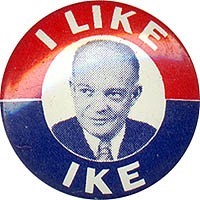24 October 2019
Today we take a brief detour from the main road – The Blacktop, as it is known in parts of Eisenhower’s Kansas – and bumble off into the tall grass.
One leadership quality that I think is often overlooked and vitally important to any endeavor is prudence. Without it any undertaking, no matter how exciting, visionary, difficult, unrewarding or some combination of those, is more than likely to run asunder and not stand the test of time. Some of the most admirable people, projects and institutions share a common ingredient: a generous helping of prudent leadership. Often not as easily visible and sometimes even uncomfortable or awkward in its manifestation, there is always some prudent voice that instills confidence in great teams. Prudence: what a dull and uninteresting word to describe something so essential!
Or is it? Does the word prudence call to mind Chaucer’s Parson?
He was a shepherde and noght a mercenarie.
And thogh he hooly were and vertuous,
He was to synful men nat despitous,
Ne of his speche daungerous ne digne,
But in his techyng discreet and benynge.
Or is prudence crusty Henry Potter taking over the soft-hearted and unprofitable Bailey Building and Loan? Is Prudence your great grandmother in a high starched collar and plain dress?
No fun at parties these prudent guys.
Our modern era has incorrectly reformulated prudence as cautious or prudish ( an unrelated word to which we return in due course ). Upon further review, as we say in the NFL, prudence has a long and lovely history stretching back thousands of years and her origins are far from boring.
Aristotle used the word phronesis to describe “practical wisdom,” and summed it up in a bit of charming folk wisdom worthy of any Almanack:
“A man is aware that light meats are easily digested and beneficial to health but does not know what meats are light. Such a man is not so likely to make you well as one who knows that chicken is good for you.”
Yes, enough with the theoretical; chicken good. Phronesis gradually was rendered in Latin as prudentia and no less a worthy than Thomas Aquinas regarded prudence as the first and most important of the virtues, since it guides us on how to act in concrete circumstances and acts as a governor on our self-will. Not flashy perhaps, but it’s hard to think of a more foundational quality than prudence, whether the enterprise is a scout troop, county government or Google.
By the Middle Ages, Prudence – one of the four Cardinal Virtues – came to be personified as a gentle and attractive woman holding a mirror in one hand and a snake in the other. The mirror suggests self-awareness, perspective or wisdom and the serpent a threatening or difficult situation. Holding them both at the same time? Something quite fascinating: having the capacity to arrive at the best course of action, under any condition, that results in the greatest good. The art of acting well in particular situations.

Until my own recent enlightenment, I would have guessed that the words prudence and prude are relatives. They are not. Such is the misuse and misunderstanding of modern prudence. Prude derives from an entirely different root; prode femme would have been a good woman in old France where it originated. Today, that interpretation is a bit…..dated.
If asked to associate prudence in a well-known person, I give the nod to Dwight Eisenhower, whose stock has been steadily rising since his charismatic successor led us into the age of sound bites and photo ops. Ike was a commanding general, yet his political leadership was marked by a quiet confidence and practicality in domestic and foreign matters. No theoretician with Utopian schemes or slick talking sales-man, Eisenhower was roundly criticized for his bumbling, inarticulate style and mocked by his detractors as an ineffectual bumpkin.
Dwight Eisenhower ended the Korean War, preserved peace and prosperity at home, patiently diminished the Red Scare and refused to enact profligate policies that betrayed his bedrock principles and experience. He defeated the theorizing egghead Adlai Stevenson twice. He was a man you could and did respect for his steady hand and wisdom.
One of the more famous campaign slogans, from 1952:

Revisiting Eisenhower, The Atlantic ran this interesting article a few years ago
The Brilliant Prudence of Dwight Eisenhower
Ike, channeling his inner Aristotle and his windy Kansas origins, notes with approval the Robert Frost line, “The strong are saying nothing until they see.”
So we come to see prudence not as high-minded parson, narrow-minded banker or disapproving scold, but as the minder of the serpent and one skilled at steadfast action guided by experience and foresight.
Is this not the kind of leadership most prized in enduring organizations? The sort of person you want on your team? I think sometimes we get so enamored of the latest cool ideas and transitory fads that we forget fundamental things.
